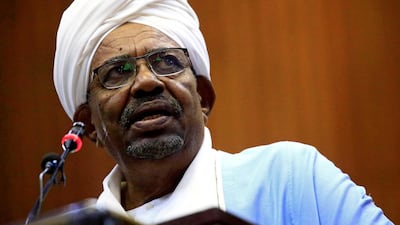More than 100 Sudanese diplomats with alleged ties to the regime of former Sudanese ruler Omar Al Bashir have been removed from their posts.
The sacking of the ambassadors, diplomats and administrators was announced by Sudan's Empowerment Removal Committee as it clears house following the removal of the country's ruler in April last year after almost 30 years in power.
"One hundred and nine ambassadors, diplomats and administrators were fired from the Ministry of Foreign Affairs, and those were appointed through political and social empowerment," Mohamed Al Faki, deputy head of the committee, said in the capital, Khartoum.
The Empowerment Removal Committee was created in November. The legal entity has been tasked with dismantling Al Bashir’s political regime following his removal, prompted by popular protests.
The fired diplomats were either appointed by Al Bashir or chosen through his now-disbanded National Congress Party, committee member Taha Othman said.
The overhaul of Mr Al Bashir's political apparatus and the wave of sackings at Sudan's foreign ministry came as the country plots a path through a fraught transitional period and attempts to rebuild foreign relations.
Sudan agreed to hand over Al Bashir to the International Criminal Court in February, where the former ruler faces five counts of crimes against humanity and two counts of war crimes.
The crimes relate to offences committed during Sudan’s military campaign in Darfur between 2003 and 2008.
Sudan's Sovereign Council, put in place to lead the country during its transition to democratic elections, said all Sudanese individuals wanted by the ICC would appear before the court.
It has been more than 10 years since the ICC issued the first of two warrants for the former leader.
The first was made in March 2009 and a subsequent warrant was used in July 2010.
As it looks for rapprochement with the West, Sudan has agreed to compensate the families of American sailors killed by Al Qaeda when the group bombed the USS Cole 20 years ago. It has also made overtures to Israel.
The Empowerment Removal Committee has also taken Sudan’s financial system to task.
In February, the legal committee dissolved the boards of Sudan’s central bank and 11 state-owned banks. The managers of eight banks were also sacked and assets belonging to the former ruling party were seized.

